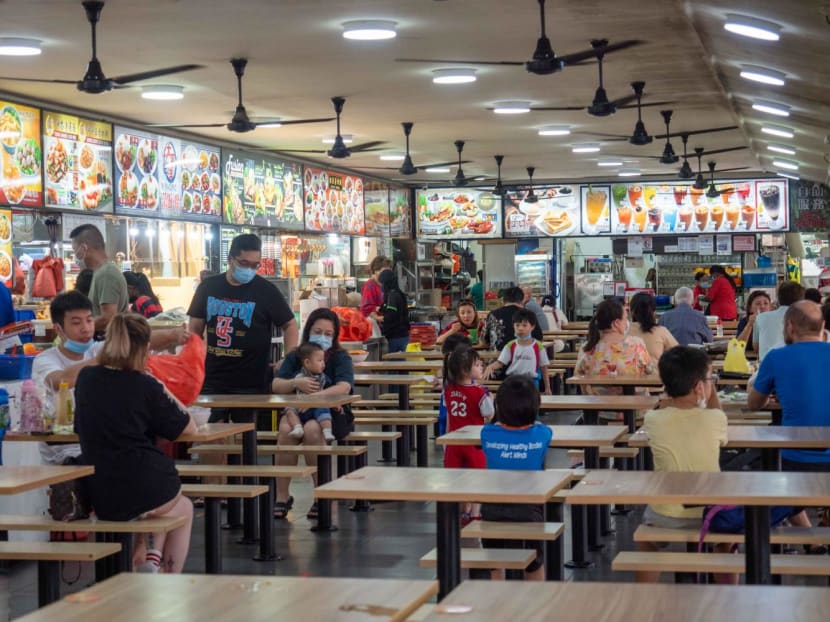Coffee-shop resale prices: 7 in 10 deals since 2010 were not over S$10 million

- Since 2010, 70 per cent of the resale deals for coffee shops in public housing estates were at or below S$10 million
- In 2015, after a coffee shop in Bukit Batok was sold for S$31 million, food prices at the venue were only marginally higher
- A coffee shop in Tampines that recently sold for a record S$41.68 million was bought from HDB in 1992 for S$3.45 million
- These figures were revealed by National Development Minister Desmond Lee in Parliament
SINGAPORE — The recent multimillion-dollar sales of coffee shops in public housing estates have made news headlines in recent weeks, but National Development Minister Desmond Lee said that most transactions in the past decade or so have gone for far less.
Since 2010, 70 per cent of resale transactions of coffee shops under the Housing and Development Board (HDB) were at or below S$10 million, the minister said in a written parliamentary reply on Tuesday (July 5)
“Resale volume is also fairly low, with an average of 15 transactions per year since 2010.”
Mr Lee was responding to questions filed by four Members of Parliament (MPs), namely Associate Professor Jamus Lim for Sengkang Group Representation Constituency (GRC), Mr Sharael Taha (Pasir Ris-Punggol GRC), Mr Shawn Huang (Jurong GRC) and Ms Foo Mee Har (West Coast GRC).
They had asked questions related to HDB’s considerations when deciding where coffee shops would be built and whether high transaction costs will be passed on to consumers through higher food prices.
Last month, Chinese news channel 8world reported that a coffee shop at Block 201 Tampines Street 21 was sold for a record S$41.68 million and that another at Block 848 Yishun Street 81 was bought over for S$40 million.
In reply to a separate parliamentary question filed by Non-Constituency MP Hazel Poa, Mr Lee revealed that the Tampines coffee shop was sold by HDB in 1992 for S$3.45 million and had not been resold since then, until the recent deal.
The Tampines deal topped the previous reported record of S$31 million for a coffee shop in Bukit Batok in 2015. At the time, then National Development Minister Khaw Boon Wan said that the sale was a clear outlier.
In his written response on Tuesday, Mr Lee said that despite the high selling price of that Bukit Batok coffee shop, food prices were only “marginally higher”, by 10 to 20 cents.
“And a cup of coffee is the same as compared to other nearby coffee shops,” he added.
The Tampines and Yishun coffee shops were among 400 coffee shops that have been sold by HDB in the 1990s to private owners. Since 1998, HDB no longer sells coffee shops and merely leases them.
The prices of the two coffee shops were set by the market, which is especially competitive for suburban areas, Mr Lee said.
“We are mindful of the need to ensure that residents have access to affordable cooked food options, and of the potential impact of such transactions, and have therefore put in place various measures over the years.”
One key measure is to have a good number of coffee shops in every HDB estate and town so that there is healthy competition, Mr Lee said.
For instance, the Tampines and Yishun coffee shops are both located in neighbourhood centres that have five and seven coffee shops respectively within a 400m radius.
HDB coffee shops can also be run by social enterprises, such as NTUC Foodfare, to help keep food prices low.
To ensure residents have easy access to different food options, HDB has built 34 coffee shops in the last four years and another 30 will be completed in the next four years.
Aside from coffee shops, there are more than 100 hawker centres in Singapore, with four new centres set to open this year and another seven being planned or under construction.
“Ultimately, consumers must be given the choice to go elsewhere,” Mr Lee said.
“This applies to stallholders as well. If the rents set by coffee shop owners are too high, stallholders could move to other eating establishments, resulting in vacant stalls and holding costs for the owners.”
In 2018, HDB introduced “price-quality” tenders when leasing coffee shops. During the process of selecting an operator, half of the points awarded is based on the operator’s quality, which includes the availability of budget meals, having a good track record and its community initiatives.
Operators who successfully tender for HDB coffee shops typically provide budget food options costing around S$3 at every stall, Mr Lee said.
The rental fees for coffee shops under these price-quality tenders are also lower and more sustainable than under pure price bidding tenders, he added.
“HDB regularly monitors the resale market for HDB coffee shops, as well as the prices of food in both rental and sold coffee shops, and will not hesitate to review its policies to address affordability concerns where necessary,” Mr Lee added.











